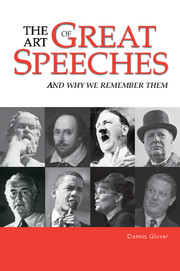Book contents
- Frontmatter
- Contents
- Speeches
- Photographs
- Acknowledgements
- Introduction
- Chapter 1 To save a republic
- Chapter 2 Speech – the essence of democracy
- Chapter 3 Forum
- Chapter 4 Style
- Chapter 5 Emotion
- Chapter 6 Character
- Chapter 7 Evidence
- Chapter 8 Morality
- Chapter 9 Gettysburg
- Chapter 10 Speechwriter
- Conclusion: The ideal orator
- Appendix Common figures and terms
- Notes
- Index
- Frontmatter
- Contents
- Speeches
- Photographs
- Acknowledgements
- Introduction
- Chapter 1 To save a republic
- Chapter 2 Speech – the essence of democracy
- Chapter 3 Forum
- Chapter 4 Style
- Chapter 5 Emotion
- Chapter 6 Character
- Chapter 7 Evidence
- Chapter 8 Morality
- Chapter 9 Gettysburg
- Chapter 10 Speechwriter
- Conclusion: The ideal orator
- Appendix Common figures and terms
- Notes
- Index
Summary
A few years ago in my country there was a minor media storm. Newspapers began reporting the ‘scandal’ that some politicians had been hiring a speechwriter to draft their speeches. It became an issue on talkback radio; the speechwriter became a target of anger, and it culminated in headlines like: ‘Another minister caught using a speechwriter’. That speechwriter was me.
This episode struck me as strange. After all, isn't making speeches what politicians are supposed to do? Aren't the politicians we love the most the ones who employ the best speechwriters? Isn't it the case that words can outlive deeds and inspire the best to run for office? What, after all, are the Kennedys and Martin Luther King today but a rich legacy of inspiration for a new generation? And don't the newspapers usually applaud loudly when a politician makes a speech that's intelligent, witty, surprising and inspiring? Those headlines seemed to me the equivalent of: ‘surgeon caught buying sharper scalpel’.
Some time later, the same newspapers had another complaint: the dismal standard of oratory of modern politicians, especially the Senate chamber was about to provethen Australian prime minister Kevin Rudd, who in one prominent editorial was given ‘10 out of 10 for content, nought out of ten for delivery’.
- Type
- Chapter
- Information
- The Art of Great SpeechesAnd Why We Remember Them, pp. 1 - 7Publisher: Cambridge University PressPrint publication year: 2010



